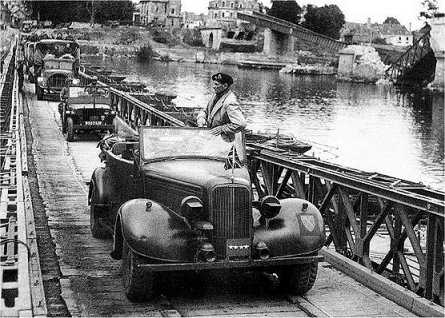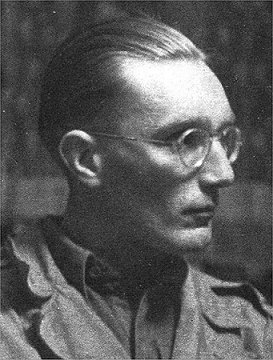1st Battalion Worcestershire Regiment - North West Europe 1944
VERNON - The River Seine Crossing (25th to 28th August 1944) - Part 13
EPILOGUE
Lieutenant-Colonel A. A. Grubb, M.C. 'Algy' Grubb was a Royal Hampshire officer who commanded ‘B’ Company of the 1st Battalion The Worcestershire Regiment during the campaign in North West Europe 1944-45. He died on 27th August 1992 while attending a ceremony in Vernon, France to mark the 48th anniversary of the Seine Crossing. This tribute below was written by Rex Fellows MC, one of his platoon commanders: "Mention Algy Grubb to anybody who served in the 43rd Wessex Division and almost certainly they will have known him or known of him – such was the impact he made on his fellow men. Following school his early ambitions to go on to the stage were diverted by parental influence towards the security of the legal profession, but it was the war, and in particular the front line battlefields, which were to give him the centre stage he had always sought. He revelled in the spotlight, a gifted extrovert with great charm and charisma. Nobody who knew him during the war years will ever forget the tall athletic figure, the sleeked-back fair hair, the aristocratic face enhanced by the occasional wearing of a monocle and the use of a long cigarette holder, the purposeful gait, and the eloquent, expressive voice. He was, in fact, commissioned into the Hampshire Regt after OCTU (Officer Cadet Training Unit) training and was seconded to the 1st Battalion The Worcestershire Regiment to command 'B' Company in May 1944. He trained for the pending invasion with tremendous, some would say, fanatical zeal, seeking realism whenever possible and earning the title of "The Mad Major" from his men. He was, without doubt, a man of destiny – a man of the times, for the times. Immediately the battalion went into action in Normandy it was recognised that his very presence gave the men around him a sense of invincibility. Such things are difficult to define – intangible threads linking man to man, giving purpose, confidence, the undying scent of victory no matter how tough the going. These outstanding qualities of leadership were reinforced by that element of luck which men like to see in their leaders. |
Major Alfred Albert 'Algy' Grubb, M.C. |
His fighting qualities received recognition by the award of the Military Cross after the first battle of the campaign at Cheux on the 27th June 1944. He was careful to see that he passed on his battle knowledge to all newcomers, endeavouring to accelerate the honing of the senses which gave men a better chance of survival. He expounded with great emphasis the absolute correctness of the fieldcraft training manuals. 'The rapid raising of the head from behind cover will be seen by the enemy.' He knew this, to his cost, when he failed to obey the rule during the battle at Vernonnet and a bullet creased his scalp.
His experiences and his organising skills together with his ability to hold an audience in the palm of his hand, meant that he was ideally suited to run the Divisional Battle School which he set up at Nijmegen, after the Elst – Arnhem battles. Together with two other battle-hardened veterans, he established a school of renown which remained in existence until the final days of the European campaign. The fast approach of the end of the fighting, and the diminishing role of the Battle School, drew him again to the scene of the action. This last foray was to provide him with material for an oft-repeated dinner party story! He returned to the Battalion and found himself participating in a skirmish on the outskirts of Bremen when he was 'hoist with his own petard' – being wounded in the arm when he chose to stand too close to a petard assault tank demolishing a barricade.
Beneath the tough exterior the inner man was surprisingly sensitive. Some forty years after the war he made known how deeply hurt he had been by an overheard wartime criticism, that he found more kindred spirits amongst his men than amongst his fellow officers. In fact he cared deeply for all around him, and was always mindful of the welfare of others. It could be said that the shared experiences of officers and men operating at the sharp end of battle, living cheek by jowl, and sharing the constant danger, creates a comradeship where badges of rank become symbols of function within the close knit team, rather than indicators of authority.
He also, in his later years, became disillusioned with the materialistic approach to their profession, of his fellow lawyers. He loved the law 'per se', it was not a means to greater wealth. Above all else, it provided him with access to the courtrooms which had become another stage where he could display his considerable powers of oratory and persuade people to his views. The timing and location of his death indicate that he had style to the very end. That his last hours should have been spent re-tracing the steps of his fierce battle in the woods overlooking the Seine at Vernonnet, is poignant. The last act! The final curtain!.
It begs the question 'Who writes the scripts?' "

Field Marshal Montgomery crossing the Bailey Bridge at Vernon (IWM)
(3rd September 1944)

